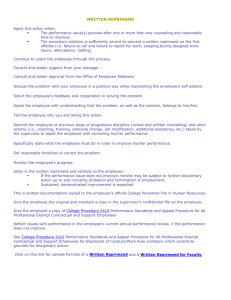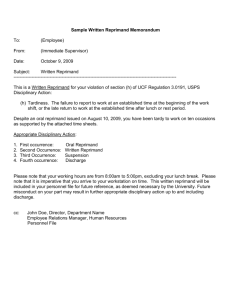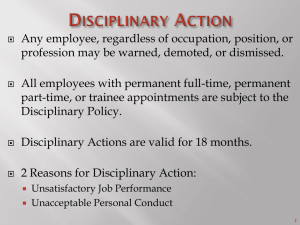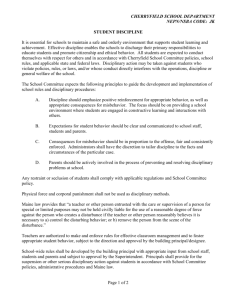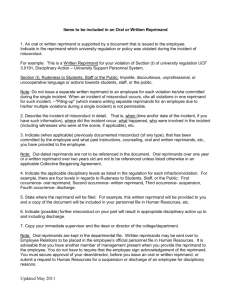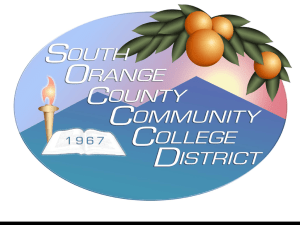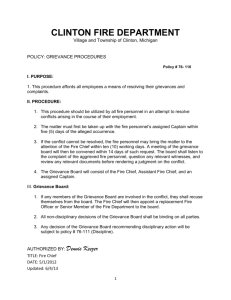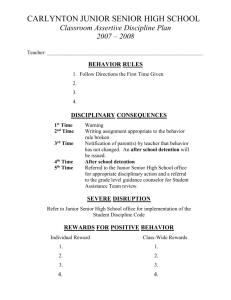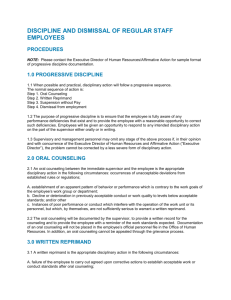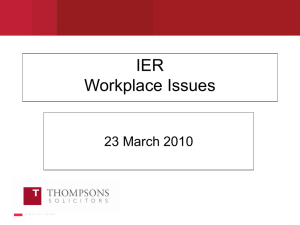Article 23- Discipline and Adverse Actions
advertisement
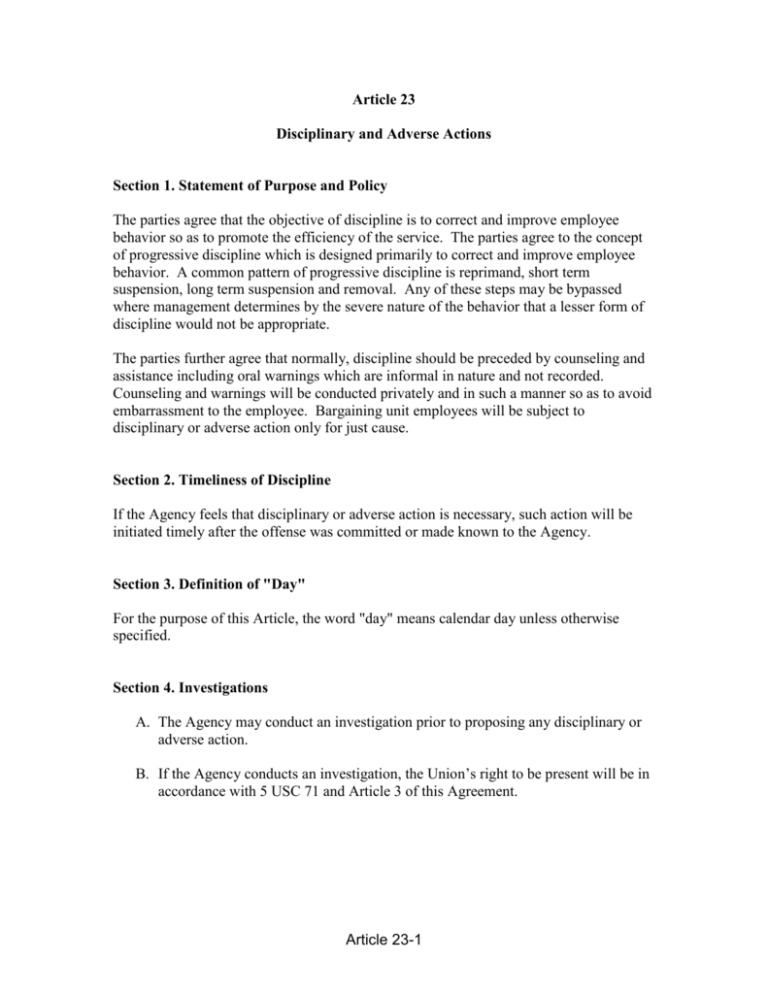
Article 23 Disciplinary and Adverse Actions Section 1. Statement of Purpose and Policy The parties agree that the objective of discipline is to correct and improve employee behavior so as to promote the efficiency of the service. The parties agree to the concept of progressive discipline which is designed primarily to correct and improve employee behavior. A common pattern of progressive discipline is reprimand, short term suspension, long term suspension and removal. Any of these steps may be bypassed where management determines by the severe nature of the behavior that a lesser form of discipline would not be appropriate. The parties further agree that normally, discipline should be preceded by counseling and assistance including oral warnings which are informal in nature and not recorded. Counseling and warnings will be conducted privately and in such a manner so as to avoid embarrassment to the employee. Bargaining unit employees will be subject to disciplinary or adverse action only for just cause. Section 2. Timeliness of Discipline If the Agency feels that disciplinary or adverse action is necessary, such action will be initiated timely after the offense was committed or made known to the Agency. Section 3. Definition of "Day" For the purpose of this Article, the word "day" means calendar day unless otherwise specified. Section 4. Investigations A. The Agency may conduct an investigation prior to proposing any disciplinary or adverse action. B. If the Agency conducts an investigation, the Union’s right to be present will be in accordance with 5 USC 71 and Article 3 of this Agreement. Article 23-1 Section 5. Reprimand An official reprimand is a written disciplinary action which specifies the reasons for the action. The reprimand will specify that the employee may be subject to more severe disciplinary action upon any further offense and that a copy of the reprimand will be made a part of both the SSA-7B Extension File and the Official Personnel Folder for up to 1 year. If a discussion is to be held when a reprimand is given, the supervisor will advise the employee of his/her right to Union representation prior to the start of the discussion. The letter of reprimand will inform the employee that he/she has the right to file a grievance on the reprimand under the negotiated grievance procedure, and the right to Union representation. Upon request, the employee and/or his designated representative will be provided, in a timely manner, copy(s) of the material relied upon to support the reprimand. Section 6. Short-Term Suspensions A. An employee against whom a suspension for 14 days or less is proposed is entitled to: 1. An advance written notice of fifteen (15) calendar days stating the specific reasons for the proposed action; 2. The right to review the material which is relied on to support the reason(s) for the proposed action; 3. Ten (10) calendar days to respond orally and in writing and to furnish affidavits and other documentary evidence in support of the response; and 4. Be represented. B. The employee will be given a reasonable amount of duty time to prepare and present a response to the proposal. Oral presentations will normally be conducted face-toface with the deciding official if the employee and the deciding official are co-located. If the employee and deciding official are not co-located, management will determine the method by which the oral presentation will be conducted with consideration given to the employee’s preference. C. After considering the employee's response, the Administration will issue a written decision. Normally the deciding official will be at a higher level of management than the proposing official. Article 23-2 D. If the decision is unfavorable to the employee, the decision may be grieved, beginning with the last (pre arbitration) step of the grievance procedure. Section 7. Removal, Suspension for More Than 14 Days, Reduction-in-Grade, Reduction-in-Pay, and Furlough of 30 Days or Less A. An employee against whom such an action is proposed is entitled to: 1. Advance written notice of thirty (30) calendar days stating the specific reasons for the proposed action; 2. The right to review the material which is relied on to support the reason(s) for the proposed action; 3. Twenty-five (25) calendar days to respond orally and in writing, and to furnish affidavits and other documentary evidence in support of the response; and 4. Be represented. B. The employee will be given a reasonable amount of duty time to prepare and present a response to the proposal. Oral presentations will normally be conducted face-toface with the deciding official if the employee and the deciding official are co-located. If the employee and deciding official are not co-located, management will determine the method by which the oral presentation will be conducted with consideration given to the employee’s preference. C. After receiving the employee's response, the Administration will issue a written decision. Normally the deciding official will be at a higher level of management than the proposing official. If the decision is to effect an action specified in this section, it will specify the reason therefore, the effective date, the action to be taken, and the decision appeal rights. The employee may appeal the decision to the Merit Systems Protection Board or, the employee may file a written grievance under the terms of this agreement. Any such grievance will be initiated at the last (pre-arbitration) step. The choice of the appeal forum is irrevocable. An employee shall be deemed to have exercised his/her option at such time as the employee timely initiates an action under the statutory procedures, or timely files a written grievance at the last (pre-arbitration) step, whichever occurs first. Any grievance must be initiated no later than 20 days after the effective date of the action. D. Employees shall be entitled to representation in all phases of these procedures. Article 23-3 E. Indefinite suspensions will be taken in accordance with 5 U.S.C. Chapter 75 and 5 C.F. R. part 752. Section 8. Request for Information If requested by the employee or his/her representative, the Agency, in a timely manner, will provide copies of all material including written statements by witnesses relied upon to support the proposal notice. In addition, nothing precludes the Union from requesting additional information in accordance with 5 USC 7114(b)(4). Section 9. Requests for Time Extensions on Proposals The Administration will not unreasonably deny a request for extension of the time to respond to proposals. Section 10. Notice to Union The Agency will provide the Union, quarterly, a sanitized copy of all reprimands and proposals of more serious disciplinary/adverse actions. Article 23-4
